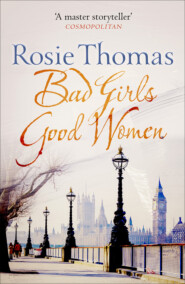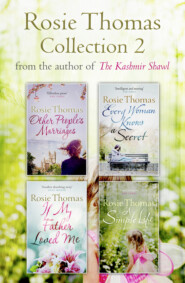По всем вопросам обращайтесь на: info@litportal.ru
(©) 2003-2025.
✖
Rosie Thomas 3-Book Collection: Moon Island, Sunrise, Follies
Автор
Год написания книги
2019
Настройки чтения
Размер шрифта
Высота строк
Поля
Her granddaughter was a different woman. The young Elizabeth was neither dreamy nor delicate and she was not especially susceptible to fears or morbid imaginings. But then she had fallen in love, and after the first delight the helplessness of her state seemed to peel her flesh raw and to leave her at the mercy of fierce influences that were not explicable by the steady rules that had governed her all her life.
And in this naked, elated and despairing condition she had seen the woman on the island.
She described her features and appearance to her grandmother, and the old woman lay back on her sofa and pleated her cashmere shawl between her ringed fingers. ‘There were stories, some of the fishermen’s wives used to whisper about a haunting. They always said in my young days that she only showed herself to other women. To young women in trouble, as a warning and a reminder.’ The diamonds flashed as the fingers suddenly stopped their fidgeting with the soft shawl. ‘Elizabeth, are you in trouble?’
‘No. Of course not.’ She knew that much, at least. Aaron wouldn’t let that happen to her. Elizabeth kept her face and her voice as bright as she could, not knowing that all she achieved was a pain-filled parody of happiness which the old woman chose to ignore. ‘I’m going to Europe, aren’t I? I’m going to see all the sights and have experiences I will remember for the rest of my life.’
‘Yes, my dear, you are and you will,’ the Senator’s widow had said.
*
Aaron and Elizabeth lay in their nest in the deserted Captain’s House. In the house next door Elizabeth’s steamer trunks were packed and her ticket for the Carpathia lay waiting for her. It was the last hour they would be able to steal together.
Elizabeth’s head rested on her lover’s chest. She could hear the steady pounding of his heart and when she moved her fingers she traced the outline of his mouth and the curve of his nose, knowing his features by touch as intimately as she knew her own. She was watching the window above their heads and the infinite gradations of pollen-yellow light that filtered through the salty glass.
‘I knew there was a suicide’s grave,’ Aaron said.
His voice resonated within the arch of his rib-cage and Elizabeth moved her head a fraction, to press her ear closer to the sound. It was like hearing two voices, the inner and the outer. ‘I saw her, standing there in the trees. I know it was Sarah and that she was watching me.’
Aaron would not deny what she had said. He lay in silence, sceptical and separate from her, listening to the contradiction of their joined breathing.
Elizabeth suddenly felt the tears running from the corners of her eyes.
‘I’ll come back,’ she whispered. ‘In a year I’ll come back to you.’
‘Is that it?’ May demanded. She was rubbing the mosquito bites on her bare ankles where the raw patches wept like tiny red eyes. The room, the house and Elizabeth’s murmuring voice made her shudder with claustrophobia. Why had the passage in the book about the grave seemed to jump out at her, when there was just such a real grave, if it wasn’t that Doone had read it before her? Angrily she pushed the thought out of her mind. She could stay real, if she concentrated hard enough. ‘You’re saying, like, this is a woman’s ghost, which only appears to women and I’m in some kind of trouble so she’s warning me just the same as she warned you when you were young?’ She shook her head, not waiting for Elizabeth’s answer, and gave a dismissive bark of laughter. The echo of it seemed to hang in the room.
‘You asked me to tell you the history,’ Elizabeth neutrally reminded her.
May jerked her head, gathering her forces, her mouth set in a hard line. Doone and her obsession, and Elizabeth and all the faded, musty business of regret and old age, and her own half-recollections and the spindrift of unease that rose from the island itself were like a gas threatening to choke her. She needed to jump away from the swirling cloud of it into fresh air. All she wanted was to be like Ivy, who was thin and impervious and desirable. ‘It sounds like total garbage to me,’ she snapped. Then, seeing the displeasure in Elizabeth’s eyes, she had to redeem herself by saying something that was clever but still distancing: ‘I mean, there’s history and there’s hysteria, isn’t there?’
There was a moment’s quiet. ‘You may be right,’ Elizabeth said softly.
May stood up and said that she would have to be getting back home.
The good weather still held. May walked through the stones and spikes of the Bennisons’ Japanese garden to the top of the beach steps. The view unrolled beneath her, shimmering in the heat-haze, as if it had been set up by a director who wasn’t afraid of using all the clichés to convey the perfection of a summer’s day on the beach.
Ivy and the Beams were playing one of their endless games of volleyball. Her legs glimmered like smooth toffee as she leaped and punched, and Lucas’s hair fanned around his face as he dived in response. His back was exactly the same colour as Ivy’s legs. Out on the backdrop of water the handkerchief sails tacked thin wakes behind them.
Marian sat with her baby grandchildren crawling around her and three of her daughters-in-law within ordering distance. Richard Beam slept in a canvas chair with his hat tilted over his face and Marty Stiegel wandered at the lacy edge of the waves. He wore a camera and the baby in a sling across his chest.
Leonie lay back in another low chair not far from Richard. In the midst of the contented families she felt that she was no more than a brittle composition of long bones. John had unobtrusively drawn closer to her chair. He sat on a sweatshirt spread on the sand, his ankles crossed and the fingers of one hand circling the wrist of the other. He was looking out to sea, apparently watching Karyn and Elliot trying to catch some wind in their dinghy sails. He wasn’t an ally, Leonie was thinking, not as she had first imagined he would be, before the kiss in the car-park. Almost without their acknowledgement the issue between them had become bigger than that, and darker because it carried the threat that everything might change because of it.
Before she encountered John Duhane, before this vacation, Leonie had gone on with her life day by day. She had done her job because she enjoyed it and found a refuge in it, and she had been Tom’s wife. The unhappy aspects of their relationship had been forced like a flower under glass by her failure to conceive, but the seeds had been there all along, and she had dutifully watered and tended the plant of their marriage because that was what she expected of herself. She hadn’t looked beyond what she possessed except to long for a baby – a yearning that had soaked up all the desires she had and more.
But in the way that everything can change, irrevocably and absolutely without warning, Leonie knew that her life had taken a different direction now. She didn’t want to drag the bulk of her unhappiness about with her any longer. The weight had become intolerable. If she had the choice simply to drop it and take a new direction – yes, that was the choice she wanted to make. It would have to be her choice. Tom would not do anything to ease the tension between the two of them; the more she thought about it the more certain she became that he would never make himself the villain. And John was inhibited by a debt of honour owed equally to his daughters and to her own married state; she didn’t think he would make the first move, although he hovered close enough to it.
Uncertainty made time stretch and distort, like a long road shimmering in a heat-haze. These beach days of sunshine and waiting, and Marian’s autocracy, seemed to dwindle into infinity behind and ahead of Leonie. She moved her bare feet in the sand, an impatient flurry of movement which made John turn his head and look at her. ‘It’s too hot out here, don’t you think?’ she said to him, the words dropping into a vacuum in which the waves and the gulls and the children’s voices were suddenly silenced. ‘Shall we go inside out of the sun?’
He unlinked his hands and stood up, as easy as if nothing significant were happening. They saw that May was walking in the thin strip of shadow at the foot of the beach wall, but as soon as she noticed they were watching her she veered sharply and arrived at the edge of the volleyball game.
‘Come up and have a cold drink in my house,’ John said.
They walked away from Marian and the encampment of baby toys and strollers. Leonie felt the eyes of her mother-in-law following her, but for once there was no call asking her to bring Sidonie’s parasol or some bottled water when she came back down again. The shingle was cool underfoot, then the wooden steps burned her with their splintery heat. She hopped too fast and almost overbalanced, and John steadied her with one hand.
‘Sorry. Should have some shoes on.’
They crossed the garden and climbed the shallow steps to the porch. Shade fell across Leonie’s burning face like a blessing. John held open the door for her and she passed into the shadowy room. The dimness and the wintry smell of woodsmoke was momentarily confusing, and she looked around to regain her bearings. A Walkman and a scatter of tapes lay on the table, amid a litter of dirty plates and glasses. Sneakers and a baseball cap and a Coke bottle decorated the steep stairs.
John opened the old-fashioned refrigerator and took out ice and mineral water. He filled a glass and gave it to her, and Leonie drank and rolled the beaded coldness between her sweaty hands. It was the first time they had been alone together since their walk to Berry Island. ‘I’m sorry,’ she said again.
‘Why do you keep saying that?’
‘I suppose I’m just used to it.’
‘That sounds like the answer of a weaker person than I think you are.’
He took her by the arms and while he was holding her looked carefully into her face. Instead of saying anything she waited, letting him discern whatever there was to see. ‘What do you want?’ he asked.
She knew what she wanted now, this minute, and the recognition made her skin burn. Beyond that she had no idea how to sort the longings into a sequence she could give voice to.
He slid his hands to her shoulders and drew her against him. There was still time, Leonie thought wildly. Everything that had happened between them up to now – talk, lunch, kiss, walk – could be lightly dismissed or explained away. She could give a little regretful laugh or a rueful shrug, and step away from John Duhane and back into the dissemblance of her life. I don’t want to. I don’t want to step back. It was impossible for everything to go on being exactly the same. Whatever she did, it would have to mean change beginning at this moment.
Even as she hesitated Leonie was reflecting on damage, and how the instrument of her infidelity would almost certainly smash the last struts of her marriage and the remnants of Tom’s affection for her – if there were any. There was John’s life to consider also, and his daughters’, and the complications that would be visited on all of them. But if there was no stepping back, all she could hope to do was walk forward. The thought was like a reprieve and it made a beat of happiness shiver through her. John saw the change in her eyes and bent his head as she lifted hers.
When they kissed the tape of guilt and self-admonition stopped running. It was natural to do what they were doing and the urgency of it amazed them both. Leonie gave herself up to him and he took the offering with pleasure. It was a long time before they moved apart again and even then he kept hold of her, as if he was afraid that otherwise he might lose her.
He was looking for words and at last he said, ‘I’ve wanted to do that almost ever since I met you. But I don’t want to cause pain, or do damage. I’ve experienced enough of that.’
His echoing of her feelings was so precise that she laughed in sudden surprise and touched his cheek with her fingers. What scarred veterans we both are, she thought. ‘I knew you did, and I know what you don’t want because I don’t want exactly the same things. But neither do I want to turn my back –’ she paused, reversing her palms upwards to reveal their emptiness ‘– on whatever chance we might have. Am I allowed to acknowledge that? Or is it misplaced?’
‘No,’ he said gently. ‘Not misplaced as far as I am concerned. But I am free to say that because I’m not married or in any way attached. Except to my children, that is.’
Leonie nodded. ‘There are some things I should tell you. I’d like to tell you, before anything else happens between us. If anything else is going to happen, of course.’
‘Would a proper drink be a help?’
‘Yes, it would.’
He found a bottle and poured whiskey for both of them. Leonie sat down on one of the battered chesterfields and let her head fall back luxuriously against the cushions. The bright sunlight squared behind the old windows made the whiskey taste dramatic and nocturnal. She blinked back the tears the first gulp brought to her eyes. ‘The failure between Tom and me began a long time ago. Began and took its course. It’s complete now. It was nothing to do with you, then or now, except that on the day we had lunch at Sandy’s Bar I looked down at my plate and it dawned on me that Tom and I didn’t love each other any more. And once I knew it I couldn’t get rid of the knowledge.’
‘I understand that.’
‘I did that clumsy thing of kissing you in the car-park. It was in a kind of reckless glee, because of what I had just realised and because I knew that at least there would be a difference now, instead of the same old painful monotony.’
‘And there was I thinking you kissed me because you wanted to kiss me.’
Leonie took another happy swallow of the whiskey. The rawness of it in her throat was fiercely pleasurable. She thought she could easily get drunk, letting all her locked-up feelings run sloppily loose, then climb into bed with John Duhane and never get up again. ‘Oh, I did want to. And I wanted to give Spencer Newton something to think about, of course.’











